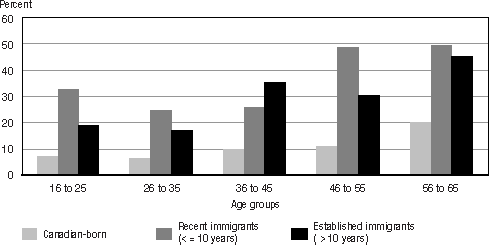
The proportion of immigrants whose mother tongue is neither English nor French at Level 1 on the prose literacy scale (37 percent) is about twice that of immigrants with a mother tongue of English or French (17 percent) and over three times that of the Canadian-born population (10 percent).
About one-third of immigrants with a mother tongue other than English or French are at or above Level 3 prose literacy proficiency compared with just over half of immigrants whose mother tongue is English or French and 63 percent of the Canadian-born.
Low literacy scores in the test language in IALSS is not necessarily a reflection of low literacy in the respondent’s mother tongue. More research is required to learn how mother tongue and official language acquisition affect literacy performance in Canada’s two official languages.
That younger age cohorts tend to score higher than older cohorts in all domains is a fact well established by previous IALS findings and confirmed in Chapter 2 (OECD and Statistics Canada, 1995). The 2003 IALSS data allow one to examine the relationship between age and prose literacy for each of three populations: recent and established immigrants and Canadian-born.
In prose literacy, younger age cohorts generally perform at a higher level than older cohorts for immigrant and the Canadian-born populations. This difference in prose literacy performance between the younger and older cohorts is more pronounced for established immigrants than for recent immigrants.
The difference in prose literacy proficiency between immigrants and the Canadian-born population remains once age is taken into account. Across the age cohorts, there are higher proportions of recent and established immigrants than Canadian-born at Level 1 proficiency. This difference in the proportions at Level 1 prose literacy is most pronounced for recent immigrants but the proportion of established immigrants at Level 1 is at least double that of the Canadian-born in each age group.
Figure 3.16
Source: International Adult Literacy and Skills Survey, 2003.